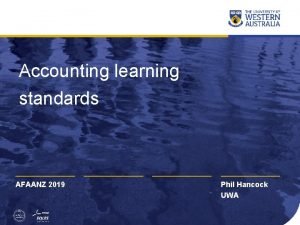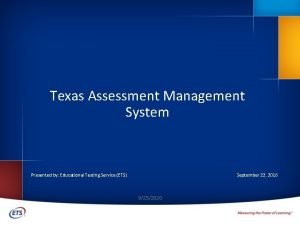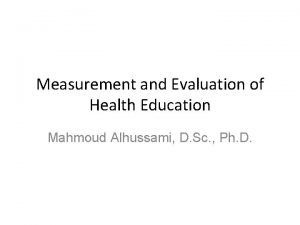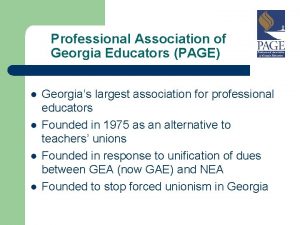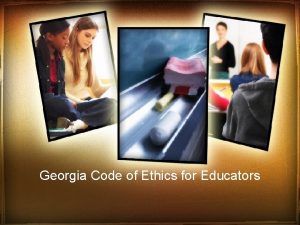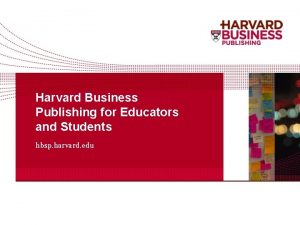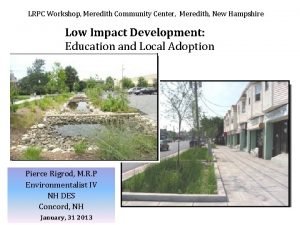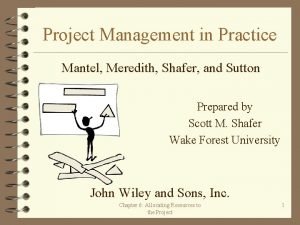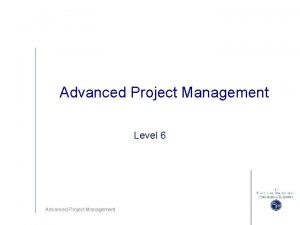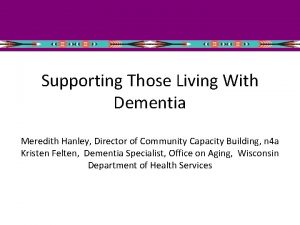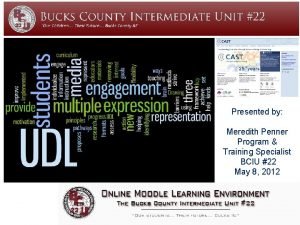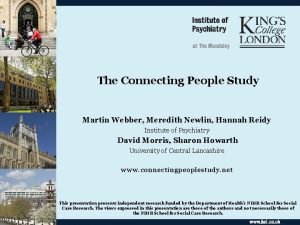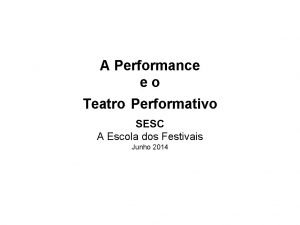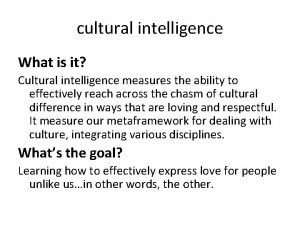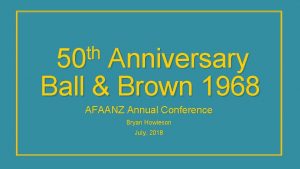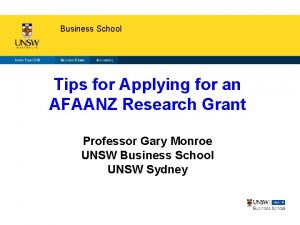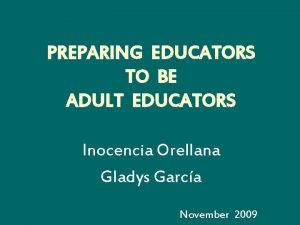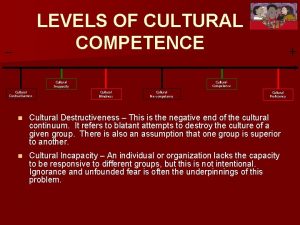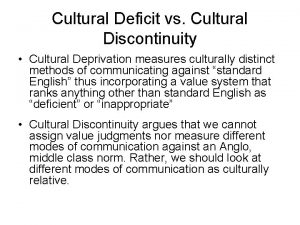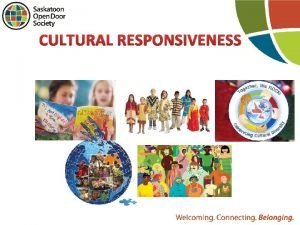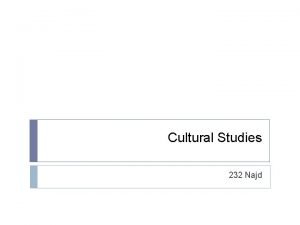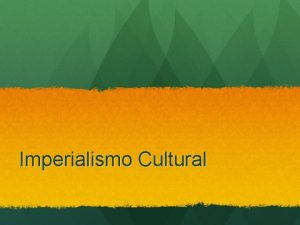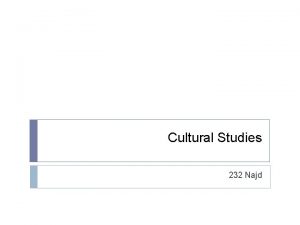Cultural intelligence for educators Dr Meredith Tharapos AFAANZ









![“CQ [cultural intelligence] is a critical capability for navigating today’s increasingly global and diverse “CQ [cultural intelligence] is a critical capability for navigating today’s increasingly global and diverse](https://slidetodoc.com/presentation_image/768fcd265b2a36802d2d193a95c47f55/image-10.jpg)

















- Slides: 27

Cultural intelligence for educators Dr Meredith Tharapos AFAANZ New Educators Forum 2019

A quick survey…. . 5 mins!

Cultural diversity • Universities are among the world’s most culturally diverse organisations (Harrison, 2012) • Consider the level of cultural diversity amongst; – students in your classroom, – colleagues at your university, and – colleagues that you research with!

Country of origin - Academic staff School of Accounting, RMIT 4

International students: Destination countries Source: The global context of tertiary student mobility (2019)

Cultural diversity in the classroom • Cultural diversity in the classroom creates the potential for; – richness and breadth of experience…. but also, – conflict, misinterpretation and marginalization – challenges regarding; • • • 6 pedagogical methodologies nature of assessment role expectations student responsibilities language standards assumed prior knowledge and capabilities (Le Roux, 2001 and Kelly, 2008)

Cross-cultural skills • Academics are increasingly required to possess cross-cultural skills (Tange and Jenson, 2012) • Some academics seem to: – move comfortably across cultural boundaries – others struggle with the complexities involved (Harrison, 2012) • Cultural intelligence (CQ) has emerged as an important factor (Keung and Rockinson-Szapkiw, 2013) 7

What is Cultural Intelligence? Cultural intelligence (CQ): • Conceptualised by Earley and Ang in 2003 • Grounded in multi-loci of intelligence theory (Sternberg and Detterman, 1986) • Defined as the ‘capability of an individual to function effectively in situations characterised by cultural diversity’ (Ang & Van Dyne, 2008, p. 3) • Four interrelated components; metacognitive CQ, motivational CQ and behavioural CQ • Measured using the 20 -item Cultural Intelligence Scale (CQS) (Ang et al. , 2007) 8 8

Cultural Intelligence (CQ) • Knowledge of cultural norms, systems & values • Making sense of culturally diverse situations • Interest and confidence required for functioning effectively in culturally diverse situations 9 Metacognitive CQ Cognitive CQ Motivational CQ Behavioural CQ • Ability to appropriately adapt behaviour for different cultural settings
![CQ cultural intelligence is a critical capability for navigating todays increasingly global and diverse “CQ [cultural intelligence] is a critical capability for navigating today’s increasingly global and diverse](https://slidetodoc.com/presentation_image/768fcd265b2a36802d2d193a95c47f55/image-10.jpg)
“CQ [cultural intelligence] is a critical capability for navigating today’s increasingly global and diverse business environment…. It’s so important that we made it one of our core behaviors at Pw. C. ” Robert Mortiz, Chairman of PWC, the Americas 10

So, how can you increase your CQ levels? • International experience has been identified as a major antecedent (Tay et al. , 2008; Moon et al. , 2012; Crowne, 2013; Tharapos et al. , 2018) • In a study of Australian accounting academics, international teaching trips to culturally distant countries was positive and significantly associated with higher CQ levels (Tharapos et al. , 2018) • But how may international teaching develop CQ? ? 11

Activity • Individually write down one strategy that you use when teaching international students (3 mins) • Discuss your strategies with others at your table (5 mins) • Each table to select one strategy to share with the room (5 mins) • Go!!!!

Critical factors (Tharapos & O’Connell, 2019) • Active participation in the host environment • Participation in communities of practice (Co. P) • Strategies informed by cultural knowledge • Reflection and reflexivity • Importance of intrinsic motivation • Enjoyment of international travel Metacognitive CQ Cognitive CQ Motivational CQ Behavioural CQ • Personal introductions • Verbal behaviour • Non-verbal behaviour

Metacognitive CQ Strategies informed by cultural knowledge High metacognitive CQ: • Knowledge of Asian students learning styles; – accustomed to didactical delivery methods – reticence in asking and answering questions during class • Sensitively moved students to student-centred teaching • Created opportunities for individual student clarification; – during class – at the conclusion of the class Well I think you need patience and you need some cultural sympathy and understanding…The Asian students quite like being led…they're not keen on interactive methods and question-andanswer sessions from the front of the class. . . They like the teacher to be the teacher, the font of all knowledge type stuff. 14

Metacognitive CQ Reflection and reflexivity • High metacognitive CQ: – Engaged in reflection and reflexivity; • individually, and • collectively within communities of practice (Co. P) • colleagues and practitioners from the host country • Low metacognitive CQ: – Was not always able to devise appropriate strategies – Was uncertain about the effectiveness of his strategies – Did not reflect on his strategies: Probably at this stage I don't think a lot about my strategies, I just go in and do it I have to say. It's not that difficult; I think I have been doing it for so long now. 15

Cognitive CQ Active participation in the host environment High cognitive CQ: • Acquired knowledge through reading – passive! • BUT, actively participating in the culture was more effective – extended conversations with locals - students, taxi drivers! – conversations, friendships, and experiences with locals yield rich knowledge of local customs and values Low cognitive CQ: 16 I'm not quite sure I really understand what's going on outside of the university and the hotel room. • Quality of the international experience, rather than quantity that is of greater significance in transforming the international experience into increased cognitive CQ

Cognitive CQ Participation in Co. P • Informal Co. P: – immediate and specific response to particular needs – discussions about proposed strategies, approaches and challenges with other colleagues – High cognitive CQ included local teaching staff and professionals from the host country in their Co. P You know, there's nothing quite like speaking to someone who's gone through the experience of actually being in a classroom…What did you do? How did you handle it? How did you get the most out of the students? 17

Motivational CQ Importance of intrinsic motivation High motivational CQ: • Enjoyed interacting with international students • Enjoyed teaching them in their own environment I really enjoy the students…you can get the class moving, and that's a buzz. It's that feeling that somehow you've crossed the cultural divide. You've connected, and that's a buzz, that's a real buzz when you do that. Low motivational CQ: • Not confident in interacting with international students • Not a key motivating factor It's good to be able to talk to the students, but I see that as a real bonus. I'm not sure that I ever achieve that. Other people seem to achieve a higher level of that. . . but I don't require it as part of the teaching trip. 18

Motivational CQ Enjoyment of international travel High motivational CQ: • Travel is a full immersion experience A whole range of things; the trip, the cultural exposure, seeing the culture of another country, traveling, just the sheer pleasure of traveling, shopping, being a bit of a tourist. I enjoy the travel, I enjoy getting out of the routine environment, I enjoy the teaching, I enjoy the interaction with the students, I enjoy being in the place. Low motivational CQ: • Not excited by travel Oh initially it was just to go overseas, have a look at the place…These days it's the same place so I tend to spend a lot of time in the hotel room. 19

Behavioural CQ Personal introductions • Allows students to get to know academics in accordance with Asian customs • Establishes a rapport with students • Students valued cultural aspects and visual depictions • Caution: Not overly self-indulgent or lengthy! I show them where I work and where I live. I show them my family and I show them a recent visitor to my house, a kangaroo…I show them pictures of holidays in Australia of iconic stuff, the Sydney Harbour Bridge, Ayers Rock, Uluru, the sort of things they might be aware of. 20

Behavioural CQ Verbal behaviour • Modifications to speech: – slow down! – pause frequently – avoid colloquial expressions • This matters to students, especially first-years Sometimes they really need to pause and wait for us to catch up. By the time I work out what she mentioned she is already a few sentences up and you have to catch up in between. We lost what she trying to elaborate in the lecture. So for us…we definitely need a pause to work out exactly what she is saying because her accent may be different from Singlish [combination of Singaporean and English], so some of the words, yeah we know what they mean but it is a few seconds later. (Student) 21

Behavioural CQ Non-verbal behaviour Changes to non-verbal behaviour: • appear approachable and not intimidating • friendly demeanour and relaxed stance • taller participants sat down when speaking with students • exaggerate body movements to emphasise significant points They wouldn't ask questions, …so I go up to them individually, then they will ask. But I had to go to them, and stand there and often I would squat down to try and get at their level so you didn't feel like you were looking over. I think it's less intimidating if you can do that, pull up a chair so you're at their level. So I found if I did that then they'd start to initiate some things. 22

The good news…. . CQ is malleable. CQ can be developed over time through intercultural experiences, travel and training. Enjoy the journey! 23

Want to know more? Talking Accounting http: //www. talkingaccounting. com/

Survey outcome…(for your eyes only)!

Australian Accounting Academics: Average CQ scores (Tharapos et al. , 2019) Tharapos, M. , O’Connell, B. , Dellaportas, S. , & Basioudis, I. (2019). Are accounting academics culturally intelligent? : An empirical investigation. The British Accounting Review. 51(2), 111 -129. doi: https: //doi. org/10. 1016/j. bar. 2018. 002

meredith. tharapos@rmit. edu. au Special acknowledgment to the late Peter Hall for his assistance with this study
 Phil hancock uwa
Phil hancock uwa Aed t&l
Aed t&l Missouri educators trust
Missouri educators trust Texasassessment management system
Texasassessment management system Measurement and evaluation for health educators
Measurement and evaluation for health educators Professional association of georgia educators
Professional association of georgia educators Lean innovation educators summit
Lean innovation educators summit Georgia code of ethics for educators
Georgia code of ethics for educators New york harm reduction educators
New york harm reduction educators Georgia code of ethics for educators
Georgia code of ethics for educators Earth educators rendezvous
Earth educators rendezvous Hbsp coursepack
Hbsp coursepack Cultural intelligence profiles
Cultural intelligence profiles Justice for meredith
Justice for meredith Meredith peters
Meredith peters Meredith community center
Meredith community center Resources scarcity
Resources scarcity Advanced project management and strategic leadership
Advanced project management and strategic leadership Dr meredith doig
Dr meredith doig Meredith sossman
Meredith sossman Meredith hanley
Meredith hanley Meredith hinkle
Meredith hinkle Meredith penner
Meredith penner Belbin training
Belbin training Meredith martin johnston
Meredith martin johnston Meredith monk turtle dreams
Meredith monk turtle dreams Giles meredith
Giles meredith Sophie meredith
Sophie meredith
